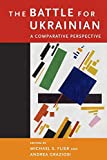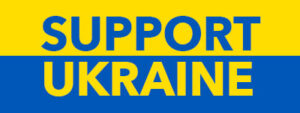In this edition of Knyzka Corner, we will be discussing The Battle for Ukrainian – A Comparative Perspective, edited by Michael S. Flier and Andrea Graziosi.
The Battle for Ukrainian – A Comparative Perspective, published by the Ukrainian Research Institute at Harvard University, outlines the difficult history of the Ukrainian language. In June 2014, the Harvard Ukrainian Research Institute organized a conference to commemorate the one hundred and fiftieth anniversary of the 1863 Valuev Circular, which repressed the use of Ukrainian in the Russian Empire. This volume is a compilation of the conference papers dealing with the linguistics, history, and politics of the Ukrainian language question. Little did the conference organizers know, but in the very same year of 2014, Russia would once again violate Ukraine’s right to exist by annexing Crimea and supporting an insurgency in Eastern Ukraine. In 2022, Russia would use Russian language rights as an excuse to invade Ukraine.
In the “Introduction,” the editors provide an overview of the history of The Battle for Ukrainian. The Valuev Circular of 1863, and the more brutal Ems Decree of 1876, were the tools used by the Imperial Russian government to destroy Ukrainian language evolution. The Russian Ministry of Internal Affairs was headed by Petr Valuev. His goal was, “to contain Ukrainian literature, to prevent its expansion, and to deny the common people access to Ukrainian literature.” (p. 45) He believed that, “Ukrainian activists could use the increasing prominence of the Ukrainian language as a symbolic flag representing an independent Ukraine of the future.” (p. 4) These decrees may have slowed the development of Ukrainian publications, but they were not destroyed. Meanwhile in the western part of Ukraine, under the Austro-Hungarian Empire, “Ruthenian” or the “prosta mova” of the common people was permitted in schools and local government, while Polish and German dominated higher education. New Ukrainian writers were also starting to speak out such as Taras Shevchenko, Lesia Ukrainka, and Ivan Franco.
During the Soviet era, the Ukrainian National Republic of 1918-19 spurred on the further development of the Ukrainian language. This progress ended with Stalin’s brutal collectivization and the Holodomor of the 1930’s. This was a campaign to destroy the Ukrainian intellectual elite and to Russify the nation. It was not until 1989 that the Ukrainian Soviet Socialist Republic passed a law which made Ukrainian the official state language. However, Russian continued to dominate as a language of commerce. Despite the revival of the Ukrainian language during the Orange Revolution, Victor Yanukovich passed a law to elevate Russian to official language status once again. His removal from office in 2014 marked a return to Ukrainian as the only official language. In the same year, Vladimir Putin declared that he wanted to “protect” Russian-speaking Ukrainians by annexing Crimea and invading Donetsk and Luhansk in Eastern Ukraine.
Subsequent chapters written by linguists, historians, literary specialists, and political scientists outline the development of the Ukrainian language. There are articles about the Russian Empire, the Austro-Hungarian Empire, the Russian Revolution, the World Wars, the post-war Soviet era, the Orange Revolution, and modern-day Ukraine. The case studies of language politics in Canada, India, and the former Yugoslavia all provide perspective on how languages can impact culture and identity through their growth or repression. All of the experts share a common focus on, “The importance of Ukrainian ethnic and cultural identity distinguishing itself from the multiple imperial settings in which it was placed, whether in the Polish and Austrian Catholic west, the Russian Orthodox east, or the Ottoman Muslim south.” (p. 27)
This book will appeal to a variety of readers interested in: Ukraine’s history, comparative linguistics, international politics, and Russian aggression. The dense but well written articles are thoroughly researched. Academics will appreciate the detailed footnotes. The Battle for Ukrainian has been a struggle against various imperial oppressors who sought to suppress the cultural aspirations of the Ukrainian people. It is ironic that Russia invaded Ukraine in 2022 under the false pretext that Ukraine’s Russian-speaking citizens were being denied their language rights. In this book, readers will discover that Russia forcefully denied Ukrainians their language rights for hundreds of years. “Democracy is too high an ideal to be dependent on linguistic determinism. People speaking different languages should be able to live together while being loyal to one state.” (p. 210)
Michael S. Flier is the Oleksandr Potebnja Professor of Ukrainian Philology at Harvard University. He teaches courses on Slavic linguistics and culture. He has a PhD in linguistics from the University of California at Berkeley. He has published numerous articles on Slavic linguistics and culture. Andrea Graziosi is a Professor of Modern History at the University of Naples Federico II and a past President of the Italian Society for the Study of Contemporary History. He is a fellow of Harvard’s Ukrainian Research Institute and the Davis Center for Russian and Eurasian Studies. His fields of expertise include the Holodomor and modern history. In these turbulent times, The Battle for Ukrainian has a powerful message for the international community about the importance of the Ukrainian language, “A language is not only a means of communication, it is a collective identity.” (Pp. 209-210).
The Battle for Ukrainian – A Comparative Perspective is available at Amazon (Affiliate link) and Harvard University Press.
–Reviewed by Myra Junyk


